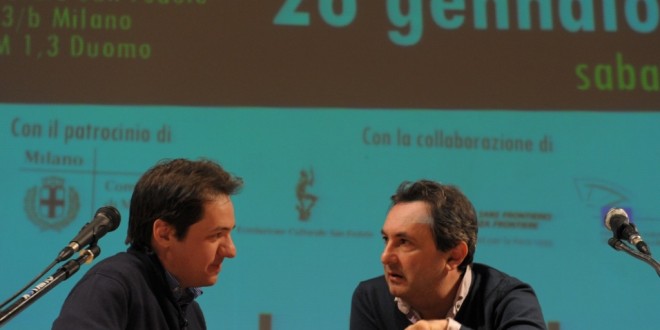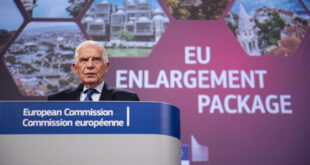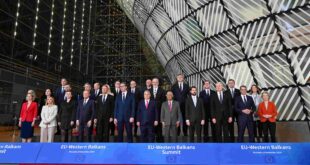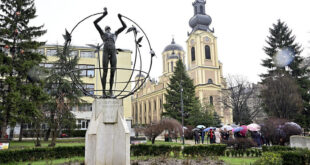Tim Judah is a journalist for the Economist, for which he writes regular feature articles in the online column Eastern Approaches. He wrote several volumes on the Balkans, including the last two on Kosovo. Davide Denti interviewed him on January 26, 2013 in Milan, at the conference Finestre Balcaniche organized by IPSIA (Qui la traduzione in italiano).
After the entry of Croatia in the EU in 2013, enlargement will see a temporary stop for some years, while other countries negotiate. At the same time, the EU will be reforming its structure and become something different than we have today. Current candidate countries do not know for what they are applying, and have no say in the evolution of the EU. Is there a way to close this growing gap between enlargement and deepening?
No, because we don’t really know what will come up in the EU. It may be a tighter eurozone, with fiscal consolidation, and a ring of non-eurozone member states around it. The future of the countries of the Balkans is tied to the one of the EU, but we just do not know towards what this last one is going.
MEP Andrew Duff, few days ago, tried to put down a likely timeline of the forthcoming EU reform. It will likely start with an EU Convention in 2015, after the next EU Parliament elections, to be followed by an Inter-governmental conference in 2016, a draft treaty by 2017 and the start of ratifications by 2018. In such case, it could be possible to open up the participation to the Convention to the current candidate countries, as it had been done with the 2001 Convention that drafted the ill-fated Constitutional Treaty. Do you think that this may be a viable option to give to the Balkan countries a stake in the process of reform of the EU?
We’re speaking theoretically, since we do not know if this is going to happen. There are people thinking that there will not be a reopening of the Treaties. Rather, something new will come out for the eurozone. Candidate countries have already some rights of participation according to the Treaties, but I think it’s unlikely that, in an already difficult and phenomenally complicated negotiation it will be allowed also to, say, Montenegro, to have a say.
Concerning regional cooperation, you talked about ‘spheres’ of economic and social networks centred on each country of the Balkans, that intermingling make up the ‘Jugosphere’. Few days ago some analysts proposed a ‘Balkan Benelux’, which would more or less coincide with the ‘Albanosphere’, as a way of fostering sub-regional cooperation and European integration of such countries. Do you think such an initiative would be positive or would it have an hindering effect on the European integration of the whole Western Balkan region?
On the wider scale, there’s already a lot being coordinated from the Regional Cooperation Council in Sarajevo. Recently, the Serbian PM Dačić talked of a Balkan Council for coordination, but we do not yet know what he exactly meant. Also the Croats have been holding talks with the Nordic Council, and requested their expertise, as an interesting example of a regional organization that includes both EU member and non-member states, and both Scandinavian and Finnish-speaking, with a certain analogy to the Western Balkan region. Then, other than the Benelux, there’s the Visegrad-4 group, set up before those countries joined the EU and still functioning as an informal grouping without even a secretariat, something that should not re-ignite the fears of a ‘new Yugoslavia’.
Let’s focus on Serbia. Some commentators have been surprised by the moves of the new Nikolić -Dačić administration, including taking up the research for a pragmatic solution for a normalization of relations with Kosovo. Is this an example of that paradox in peace-building for which only the nationalists can solve the most difficult issues? Someone, in the past said that only Nixon could go to China.
Yes, or that only Begin could make a deal with the Egyptians. There’s a possibility in it indeed, and most importantly they do believe it. Dačić says that only this government can make the deal on Kosovo. They must find that difficult balance of making a de facto agreement with Kosovo without formally recognizing it, but I think it’s doable, they can do it. The former government of President Tadic could only go as far as not to be accused of treachery. On the other hand, Dačić said in the last few months, in other words, that their government can never be accused of treachery, because after all they did go to war for Kosovo.
Concerning the relationship between President Nikolić and PM Dačić, there were remarks lately of a growing cleavage between the two, as if they were waging two different policies. The meeting of Dačić with his Croatian counterpart left Nikolić unhappy, and the Kosovo negotiation platform that leaked in December may be interpreted also as an attempt to undermine Dačić ’s work with Thaçi and the EU on Kosovo. Is there a sneaking cohabitation between the two in Belgrade?
In the previous administration there was a pyramid of power, at the end Tadic had the last word on everything. After the election there has been a kind of vying for power between Nikolić, Dačić and the SNS president Vučić. Now things are settling down a bit. The President is increasingly doing more of what he’s actually supposed to do, and not having much power. The real power is with Dačić, Vučić, and for what concerns the economy Dinkić. Nikolić is now quite grumbling on the sideline. He is isolated in the region, after his remarks on Srebrenica and Vukovar, the Croat and Bosnian leaders do not want to meet him. He can’t or won’t go back on that, while Dačić and the others can go forward. Nikolić may try to get back in the limelight by meeting with the President of Kosovo, Atifete Jahjaga, in early February, but that’s also symbolic as she has no real power either. The real power in the negotiations is with Dačić.
One last question. You said that anti-corruption is today the new nationalism. Do you see the change in Serbia, and the anti-corruption campaign that is bringing some tycoons to justice too, as cutting the grass under Dodik’s feet in Bosnia?
I have no evidence for that. The fact is that if any poll show Dodik declining in support, I don’t know to what extent that’s in relation with Serbia rather that with the fact that he and his circle are seen as rather incredibly rich while the others are still pretty poor. That may be a greater challenge for Dodik’s leadership.
 East Journal Quotidiano di politica internazionale
East Journal Quotidiano di politica internazionale





2 commenti
Pingback: Intervista a Tim Judah. Come far quadrare il cerchio del Kosovo
Pingback: Serbia after the elections: an unstable balance? | International Affairs at LSE